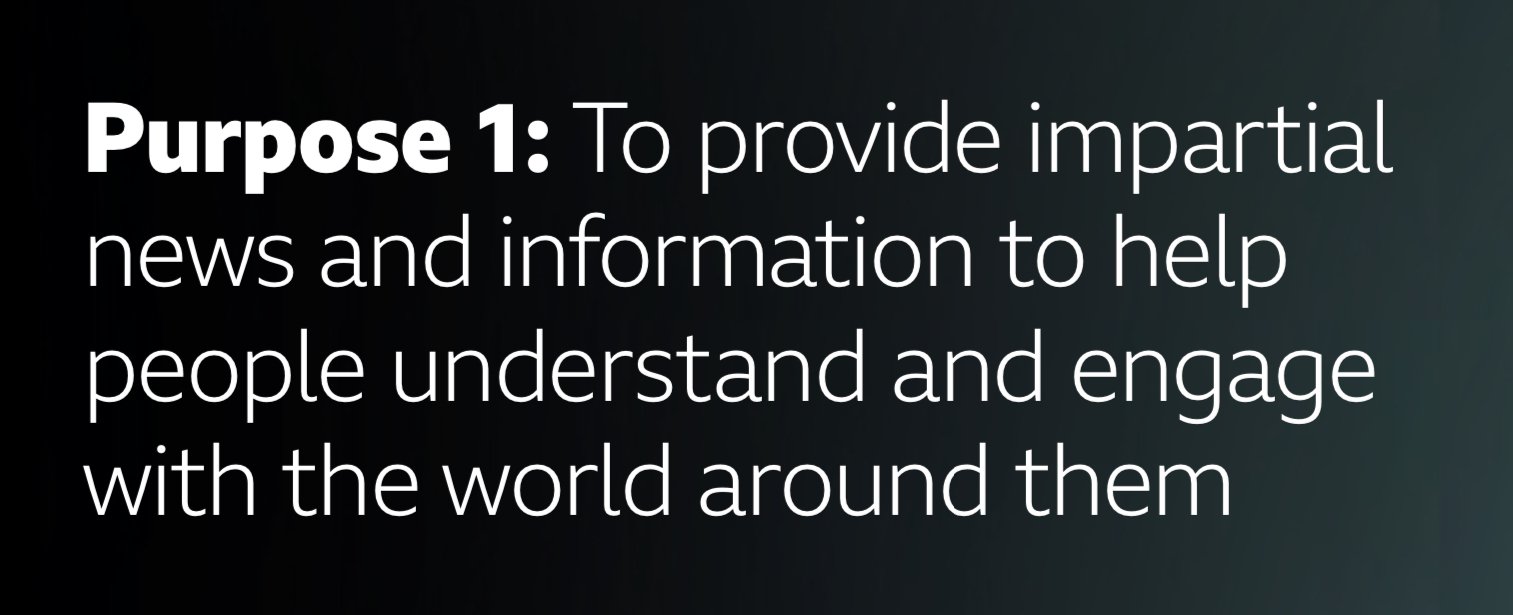Why is the BBC breaking the news?
The BBC says viewers aren't bothered about the closure of its UK News Channel. But it never really told them the full story. The Corporation doesn't belong to its managers - it belongs to the tens of millions who pay for it.
A cost of living crisis unparalleled in recent history. Economic turmoil that could plunge millions into fuel poverty. Overseen by a new Prime Minister. What an odd time for the BBC to be closing its domestic news channel.
The same BBC that, in its last annual report, called the provision of impartial news and information its number one priority. Yet the BBC plans to close its rolling news service for UK viewers, watched every week by millions of people.
The BBC says news is its top priority, while planning to shut its domestic news channel. (BBC Annual Report & Accounts 2021-22)
Instead, domestic stories will have to fight for attention on a commercial service aimed at a global audience. One that’s perhaps more interested in Washington DC than Washington, Tyne and Wear.
BBC bosses insist, according to one News Channel presenter, that audiences aren’t bothered about the shake-up*. That could be because the BBC hasn’t revealed the whole story.
Audiences have been told that the domestic News Channel will be “merged” with BBC World News, its commercially-funded international operation. But people inside the BBC have been told the World News channel will be calling the shots, setting the editorial priorities.
News judgements will be global, tailored to a worldwide audience that can be monetised, advertised to. The non-commercial UK audience will come second.
It will feel, and sound, very different. The Prime Minister will be the British Prime Minister. Leeds will become a city in “northern England”. Manchester City and Liverpool will play in the “English Premier League”. UK audiences will hear their lives reported by the BBC in the language previously reserved for a foreign country.
The only UK-specific material will be Breakfast and the 1, 6 and 10 o’clock bulletins from BBC One, and (bizarrely) a phone-in from Radio 5 Live.
What if a huge domestic story were to break? The kind that warrants cutting into normal programmes? We’re told there’ll be a team “on standby”, able to ramp up UK-specific coverage accordingly. But these are changes driven by the need to cut costs. How likely is it the BBC will keep a team on standby around the clock, ready to leap into action at a moment’s notice, when it’s trying to save money?
It’s more likely that, after a while, Sky will become the default place for breaking news, and the BBC will trail along afterwards, trying to catch up, its reputation dented.
Does it matter? It’s not as if the BBC is abandoning news entirely. But without a rolling news operation, flagship content could suffer. The News Channel generates material for the 6 and 10 o’clock bulletins, hourly radio summaries, and online. It’s the under-funded and under-appreciated backbone of the entire operation.
These changes are due next April — in part because current rules would make them impossible without giving the public a proper chance to object. Ofcom, which has some regulatory oversight of the BBC, sets conditions for the News Channel that couldn’t be met by the international service.
If only you could get rid of those conditions. Which is exactly what the BBC is trying to do at the moment. It wants Ofcom to water down the rules, allowing it to make changes without getting the regulator’s permission. It’s under those changes that the corporation wants to rid itself of the UK News Channel.
It means the only way viewers can object is by responding to Ofcom’s consultation on regulatory reform— at 109 pages it’s not the most punter-friendly process you’ll ever encounter.
We know from past experience that, without firm regulation, broadcasters will water down and weaken past commitments. ITV slowly abandoned children’s programmes, arts coverage, regional production and serious prime-time documentaries, each time pleading poverty.
The BBC doesn’t have to deliver a profit, but it does have to deliver big audiences to justify the licence fee, and things like rolling news, never likely to pull Strictly-sized ratings, are easily sacrificed to fund another derivative shiny-floor entertainment monolith.
The same logic applies to hollowing out BBC Four, or chopping chunks out of local radio stations. Some people will be upset, but they won’t be able to make the right kind of attention-seeking fuss that gets things changed.
Politicians often forget, when tinkering with the BBC, that it doesn’t belong to them. It belongs to us — all of us. But the same is true of the current, transient, generation of BBC leaders.
This 4-billion pound business is not a personal plaything to be chopped up for likes and shares. It’s a vital part of how the UK tells its story to itself. Those who manage the BBC hold it in trust, and should hand it to the next generation in at least no worse a state than they inherited.
This high-handed habit of far-reaching pronouncements, of treating the audience as little more than an annoyance, does this hundred-year-old institution no favours.
* I could have linked here to recent tweets by BBC presenter Martine Croxall, setting out what the closure plan would mean for UK viewers. But those tweets have all disappeared. There could be many reasons for that, but let’s be honest, it wouldn’t be the first time a BBC presenter had been hauled over the coals for saying or doing something BBC managers didn’t like. This Stasi-like management, this unforgiving culture of omertà, is no way to run an organisation that spends billions in public money every year, and should not fear criticism or accountability. It’s the kind of behaviour that, if enforced in other workplaces, would attract the attention of a journalistic organisation like, say, the BBC.

